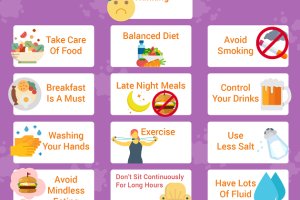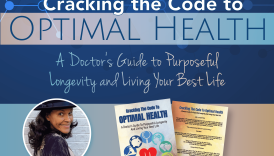10 Proven Ways to Stay Healthy and Thriving

In today’s fast-paced world, taking care of one’s health is often overlooked amid the hustle and bustle of daily life. However, maintaining a holistic approach to wellness can significantly enhance quality of life. It’s not just about avoiding illness; it’s about thriving physically, mentally, and emotionally.
- 10 Proven Ways to Stay Healthy and Thriving
- Why Wellness Matters
- Importance of Regular Exercise
- Cardiovascular Workouts
- Strength Training
- Balanced Diet and Nutrition
- The Benefits of Eating Whole Foods
- Hydration and Its Impact on Health
- Sufficient Sleep and Rest
- Establishing a Bedtime Routine
- Creating a Relaxing Sleep Environment
- Stress Management Techniques
- Mindfulness Meditation
- Physical Activities to Reduce Stress
- Regular Health Check-ups
- Importance of Preventive Screenings
- Building a Relationship with Your Healthcare Provider
- Mental Well-being Strategies
- Journaling for Emotional Processing
- Seeking Professional Help When Needed
- Social Connections and Support System
- Benefits of Strong Social Ties
- Building Healthy Relationships
- Time Management and Productivity
- Prioritizing Self-care in Daily Schedule
- Setting Realistic Goals and Expectations
- The Role of Hobbies and Interests in Overall Wellness
- Benefits of Pursuing Hobbies
- Finding Time for Your Interests
Why Wellness Matters
Achieving overall well-being involves multiple facets that work synergistically. Here are key elements to consider:
- Regular Exercise: Engaging in both cardiovascular workouts and strength training keeps the body strong and energizes the mind.
- Balanced Nutrition: Eating whole foods and staying hydrated are the building blocks of nourishment.
- Adequate Sleep: Prioritizing rest rejuvenates the body and enhances cognitive function.
- Stress Management: Incorporating techniques like mindfulness boosts mental clarity and reduces anxiety.
Consider this: A close friend finally committed to a balanced routine that included exercise, nutrition, and rest, and they reported feeling more energetic and focused in their everyday tasks. This just goes to show that the effort to prioritize wellness pays off, leading to a more fulfilling life.
Importance of Regular Exercise
Continuing the conversation about wellness, one of the cornerstones of a healthy lifestyle is regular exercise. Not only does it contribute to physical fitness, but it also improves mental well-being and fosters social connections.
Cardiovascular Workouts
Cardiovascular workouts, often referred to as cardio, are essential for heart health and improved stamina. Activities like running, cycling, and swimming get your heart rate up and can lead to numerous benefits including:
- Improved Heart Health: Strengthens the heart and lungs, reducing the risk of cardiovascular diseases.
- Weight Management: Helps burn calories effectively.
- Enhanced Mood: Releases endorphins that improve emotional well-being.
Take, for instance, a friend who started jogging a few times a week. They noticed not just physical changes but also a lift in their mood and energy levels.
Strength Training
Complementing cardio, strength training builds muscle mass and boosts metabolism. Engaging in exercises such as weight lifting or bodyweight workouts is critical for:
- Bone Health: Increases bone density, reducing the risk of osteoporosis.
- Functional Strength: Aids in everyday activities, from lifting groceries to climbing stairs.
- Body Composition: Helps in maintaining a healthy weight by building lean muscle.
For example, a co-worker who embraced strength training reported feeling stronger and more capable in daily tasks, illustrating how both cardio and strength training are vital for a well-rounded fitness routine.
Balanced Diet and Nutrition
As we dive deeper into the components of a healthy lifestyle, nutrition plays a pivotal role. A balanced diet not only fuels the body but also affects mood, energy levels, and overall well-being.
The Benefits of Eating Whole Foods
Eating whole foods—like fruits, vegetables, whole grains, and lean proteins—can transform one’s health. These nutrient-dense foods are packed with vitamins and minerals that:
- Boost Immunity: Strengthen the body’s defenses against illness.
- Aid Digestion: Promote a healthy gut with natural fibers.
- Enhance Energy Levels: Provide sustained energy as they are slow to digest.
For example, after swapping processed snacks for fresh fruits and nuts, a friend noticed fewer energy dips throughout the day, which significantly improved productivity.
Hydration and Its Impact on Health
Hydration is another crucial aspect of nutrition that often gets overlooked. Drinking adequate water is vital for:
- Cognitive Function: Improves concentration and mental clarity.
- Physical Performance: Boosts endurance and reduces fatigue during workouts.
- Detoxification: Helps the body eliminate waste effectively.
In light of this, a colleague began tracking their water intake and realized they were often under-hydrated. Increasing their daily water consumption led to increased alertness and overall better health, underscoring how simple changes can have a powerful impact on well-being.
Sufficient Sleep and Rest
As we explore further into maintaining health, it’s essential to highlight the significance of sufficient sleep and rest. Quality sleep rejuvenates the body, boosts mental clarity, and prepares individuals for the challenges of the day ahead.
Establishing a Bedtime Routine
Creating a bedtime routine signals to the body that it’s time to unwind. Setting a consistent schedule can make a world of difference. Here are some effective tips:
- Consistent Sleep Schedule: Go to bed and wake up at the same time every day, even on weekends.
- Pre-Sleep Activities: Engage in calming activities like reading or gentle yoga to relax.
- Limit Screen Time: Reduce exposure to screens at least an hour before bed to improve sleep quality.
A friend who adopted this routine shared how they now fall asleep faster and wake up feeling more refreshed.
Creating a Relaxing Sleep Environment
The sleep environment greatly influences the quality of rest. Simple adjustments can transform a space into a sleep oasis:
- Comfortable Bedding: Invest in a good mattress and pillows to ensure physical comfort.
- Dim Lighting: Use blackout curtains or eye masks to keep light out.
- Cool Temperature: Keep the room cool, as a slightly lower temperature promotes better sleep.
For instance, after making her bedroom more serene by decluttering and adding calming scents, a colleague reported feeling more relaxed and ready for sleep. These small changes reflect the impact of a peaceful environment on quality rest and overall health.
Stress Management Techniques
Transitioning into stress management, it’s crucial to understand that effectively managing stress can lead to significant improvements in overall wellness. Various techniques can help individuals adapt to life’s challenges more gracefully.
Mindfulness Meditation
Mindfulness meditation is a powerful tool for enhancing focus and reducing anxiety. It teaches individuals to live in the present moment, which can lead to a more serene state of mind. Here are some benefits:
- Enhanced Awareness: Increases awareness of thoughts and feelings, helping to manage them better.
- Reduced Anxiety: Lowers levels of cortisol, the stress hormone.
- Improved Emotional Health: Promotes a greater sense of calm and overall well-being.
A friend of mine began practicing mindfulness for just ten minutes a day and shared that it helped clear her mind of clutter, allowing her to navigate stressful situations with ease.
Physical Activities to Reduce Stress
In addition to mindfulness, engaging in physical activities offers excellent stress relief. Exercise releases endorphins, the body’s natural mood elevators. Consider these options:
- Walking or Jogging: Simple and effective ways to clear the mind.
- Yoga: Combines physical movement with deep breathing, fostering relaxation.
- Team Sports: Provide not only physical activity but also social interaction, which can lift spirits.
For example, after joining a local hiking group, a colleague found that being active outdoors not only got her moving but also helped her connect with others, greatly decreasing her stress levels. Incorporating these techniques into daily life can pave the way to greater peace and resilience.
Regular Health Check-ups
As we continue our journey toward holistic wellness, regular health check-ups are vital to ensuring long-term health and early detection of potential issues. Staying proactive about one’s health not only leads to peace of mind but can also save lives.
Importance of Preventive Screenings
Preventive screenings play an essential role in identifying health risks before they become serious. It’s like having a safety net that can catch issues early. Here are some key benefits:
- Early Detection: Identifying conditions like high blood pressure or diabetes can lead to better outcomes.
- Customized Health Plans: Screenings help tailor recommendations specific to individual health needs.
- Peace of Mind: Regular visits can alleviate anxiety about one’s health status.
A friend shared how routine screenings revealed elevated cholesterol levels, prompting lifestyle changes that improved his overall health.
Building a Relationship with Your Healthcare Provider
Establishing a relationship with your healthcare provider fosters trust and open communication, which is crucial for effective healthcare management. Here are a few tips:
- Regular Visits: Make it a habit to schedule annual check-ups.
- Open Communication: Discuss health concerns freely to get the most out of your visits.
- Continuity of Care: Building rapport allows for a more personalized approach to health management.
For instance, maintaining a consistent dialogue with her doctor helped a colleague navigate her health concerns more effectively, empowering her to make informed decisions about her care. By prioritizing check-ups and relationships with healthcare providers, individuals can better navigate their health journeys.
Mental Well-being Strategies
Transitioning into mental well-being, it’s crucial to recognize how taking care of one’s mental health is as important as physical health. Implementing effective strategies can pave the way for emotional resilience and stability.
Journaling for Emotional Processing
Journaling is a practical approach for emotional processing and self-reflection. It allows individuals to express their thoughts and feelings freely, fostering clarity. Consider the following benefits:
- Emotional Release: Writing can serve as a healthy outlet for pent-up emotions.
- Increased Self-Awareness: Regular reflection helps individuals understand their thoughts and behaviors.
- Stress Reduction: Journaling can reduce anxiety by clearing mental clutter.
A personal anecdote: after a particularly challenging week, a colleague started journaling each evening. She found it immensely helpful to jot down her thoughts and, surprisingly, this practice contributed to mending her emotional state.
Seeking Professional Help When Needed
It’s essential to recognize when additional support is necessary. Seeking professional help from therapists or counselors can be a game changer for many. Here are key points to consider:
- Non-Judgmental Space: Professionals provide a safe environment to explore feelings without fear of judgment.
- Expert Guidance: Trained professionals can equip individuals with coping strategies tailored to their needs.
- Enhanced Skills: Therapy allows individuals to develop better emotional regulation and problem-solving skills.
For instance, a friend who began therapy shared how it transformed his perspective on stress and relationships, showing that asking for help is a strength, not a weakness. By adopting these mental well-being strategies, individuals can significantly improve their emotional health and overall quality of life.
Social Connections and Support System
As we delve into the importance of social connections, it’s vital to acknowledge how relationships significantly impact mental health and overall well-being. Having a strong support system can buffer against stress and enhance happiness.
Benefits of Strong Social Ties
Strong social ties carry numerous benefits that contribute to emotional health. Here are some compelling reasons to nurture relationships:
- Improved Mood: Connections with friends and family can elevate mood and provide emotional support.
- Increased Longevity: Studies suggest that strong relationships may lead to a longer life.
- Enhanced Coping Skills: A solid support network offers different perspectives and encourages healthy coping strategies.
For example, a coworker recently shared how her friendships helped her navigate a career transition, emphasizing how critical these bonds became during challenging times.
Building Healthy Relationships
Building and maintaining healthy relationships requires effort and intentionality. Here are practical tips for fostering these connections:
- Active Listening: Engage in conversations meaningfully, showing genuine interest in others’ thoughts and feelings.
- Regular Check-ins: Make it a habit to reach out, whether through calls, texts, or in-person visits.
- Set Boundaries: Healthy relationships thrive when both parties respect each other’s space and needs.
Reflecting on personal experience, when a friend initiated regular catch-up sessions, they strengthened their bond, highlighting how investing time in relationships can incredibly enrich one’s life. By prioritizing social connections, individuals can cultivate a fulfilling support system that enhances overall wellness.
Time Management and Productivity
Shifting focus to time management and productivity, finding a balance between work and self-care is essential for maintaining mental and physical health. Enhancing productivity doesn’t mean sacrificing well-being; rather, it involves smart planning and resource allocation.
Prioritizing Self-care in Daily Schedule
Integrating self-care into the daily schedule is a fundamental aspect of effective time management. Here are some strategies to consider:
- Block Time for Self-care: Schedule specific times for exercise, relaxation, and hobbies, just like any other important appointment.
- Morning Routines: Begin the day with practices such as meditation or stretching to set a positive tone.
- Take Regular Breaks: Short breaks during work can prevent burnout and enhance focus.
For instance, a friend of mine found that setting aside 30 minutes each afternoon for a walk improved her productivity, allowing her to return to work refreshed and energized.
Setting Realistic Goals and Expectations
Setting achievable goals is another critical component of effective time management. Here’s how to do it:
- SMART Goals: Ensure your goals are Specific, Measurable, Achievable, Relevant, and Time-bound.
- Break It Down: Divide larger tasks into smaller, more manageable steps to avoid overwhelm.
- Adjust as Necessary: Be flexible and willing to adjust goals based on current circumstances.
In my experience, by breaking a major project into smaller tasks with deadlines, I found myself accomplishing more while feeling less stressed. By prioritizing self-care and setting realistic expectations, individuals can cultivate a balanced, productive, and fulfilling life.
The Role of Hobbies and Interests in Overall Wellness
As we wrap up our exploration of time management and productivity, it’s essential to highlight the significant role that hobbies and interests play in contributing to overall wellness. Engaging in meaningful activities outside of work not only enriches life but also serves as a vital tool for stress relief and personal satisfaction.
Benefits of Pursuing Hobbies
Incorporating hobbies into your routine offers several advantages:
- Stress Relief: Engaging in enjoyable activities can serve as a natural stress buster, helping to counter work-related tension.
- Personal Fulfillment: Hobbies provide a sense of accomplishment and joy, boosting overall happiness.
- Social Connections: Many hobbies, like team sports or art classes, foster connections with others, enhancing your support network.
For example, after taking up painting, a close friend discovered not just a soothing outlet for emotions, but also a community of like-minded individuals who provided inspiration and camaraderie.
Finding Time for Your Interests
Integrating hobbies into a busy schedule may seem challenging, but it is essential. Here’s how to make it work:
- Schedule It: Just like any other commitment, block out time in your calendar for hobbies.
- Start Small: Choose activities that require less commitment initially, making it easier to fit in.
- Be Open to New Experiences: Exploring new interests can lead to unexpected joys and passions.
In my personal journey, dedicating just an hour a week to gardening not only brought me joy but also provided a fulfilling sense of connection to nature. By prioritizing hobbies and interests, individuals can significantly enhance their overall wellness, enriching their lives and promoting balance.





